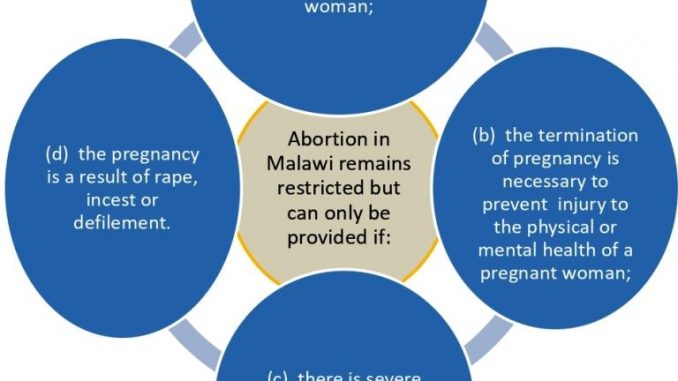
Centre for Solutions Journalism (CSJ Malawi) has declared 2020 as the year Malawi will enact new abortion law. CSJ Team writes:
New Year! New Resolutions! New Knowledge! New Year is a time of new beginnings and a fresh start. We ask you and even those in authority to seriously reflect on the following issues about our sexual health.
Sexuality Education
We need to learn from progressive nations about the benefits of comprehensive sexuality education. It is a form of education, which plays a crucial role in preparing the youth for a safe, productive, fulfilling life in a world where HIV and Aids, sexually transmitted infections (STIs), unintended pregnancies, gender-based violence and gender inequality.
Unfortunately, despite known benefits sexuality education, some have reservations without it. As WHO emphasises when young people are empowered with necessary information about their bodies and reproductive health, they make more responsible choices, including such as delaying sexual activity or using protection if they are sexually active.
So long as our country denies youth sexuality education, we will continue to grapple with teen pregnancies, early marriages, high rates of STIs and HIV among the youth.
We appeal to the government to include Comprehensive Sexuality Education as part of Life Skills currently being taught in secondary schools.
Abstinence
Without sexuality education, youths will not even appreciate the benefits of abstinence.
Sexual abstinence means refraining from all forms of sexual activity and genital contact such as vaginal, oral, or anal sex. Abstinence is the only 100 percent effective way to protect against pregnancy and sexually transmitted infections such as HIV and AIDS, syphilis and gonorrhoea.
We urge parents, school authorities, charities, chiefs and religious leaders to promote abstinence among the youth.
Contraceptives
For those who still have uncontrollable sexual drives, but do not want their sexual encounters to end up in pregnancies, contraceptives use is the way to go.
The commonly available contraceptive is the condom. The condoms are the best barrier method available for the protection against STIs and pregnancies.
Several contraceptives are also available such as:
- Long-acting reversible contraception eg the implant or intra uterine device (IUD)
- Hormonal contraception eg the pill or the Depo Provera injection
- Emergency contraception
- Natural family planning or fertility awareness
- Permanent contraception eg vasectomy and tubal ligation.
We urge the government and all relevant stakeholders to ensure that contraceptives are available to all those who need them.
Safe abortion
We are living in an unpredictable world where bad things happen to good people.
A schoolgirl may be following all the principles of abstinence to the letter, but unfortunately, she gets brutally raped and ends up becoming pregnant. What should the school girl who gets pregnant after brutal rape do?
The girl should rush to the hospital to get emergency contraceptives within three days of the sexual assault. Emergency contraception is a safe way to prevent pregnancy after unprotected sex.
Apart from emergency contraceptive, the hospital will offer her PrEP or Pre-exposure prophylaxis. PrEP is the medicine that people who are at risk for HIV take to prevent contracting the virus. An HIV negative person can avoid contracting the virus from an HIV positive person if he or she takes PrER correctly.
But being in Malawi, a nation where the government is dilly-dallying in offering sexuality education, the raped school girl may be ignorant of availability of PrEP and emergency pills. The sexual assault may end up in unwanted pregnancy.
As we mull over this, we should remember that our government has signed many international treaties on reproductive health. In many agreements, the Malawi government has pledged to offer “protection of women from cruel, inhuman and degrading treatment.” The government has committed to ensuring that “those who become pregnant as the result of coerced or forced sexual acts such as rape, incest and defilement can lawfully access safe abortion services.”
Sadly, some rape survivors struggle to access safe abortions in hospitals because most doctors and clinicians mistakenly believe abortion in Malawi is illegal. The fact is: “Abortion in Malawi is legal but only restricted.”
The proposed Termination of Pregnancy (ToP) Bill makes it clear that victims of rape, defilement and incest should have access to safe abortions if they make that decision.
We urge the Cabinet and the National Assembly to enact ToP Bill this year.
Post Abortion Care
In typical rural areas, when women have unwanted pregnancies, they seek assistance from herbalists who administer all sorts of poisonous concoctions or use crude objects to induce abortion.
A study by University of Malawi’s College of Medicine and Guttmacher Institute reveals that out of the estimated 141,000 abortions performed in Malawi in 2015, approximately 60 percent resulted in complications that required medical treatment in a health facility.
We want to remind you that every government hospital provides post-abortion care. The vision of Malawi’s National Post-abortion Care Strategy is bold. “No woman should suffer or die from complications of abortion in Malawi.”
With the government’s declaration of“no woman should suffer or die from complications of abortion in Malawi,” we ask the government to sensitise the masses about the availability of contraceptives, PrEP, restricted safe abortion services and post-abortion care.
The Board Members, Management and Staff of Centre for Solutions Journalism support the government’s planned enactment of the proposed Termination of Pregnancy Bill. We declare 2020 as the Year the proposed bill should be enacted so that “no woman should suffer or die from complications of abortion in Malawi.”
Signed by Brian Ligomeka, Executive Director
